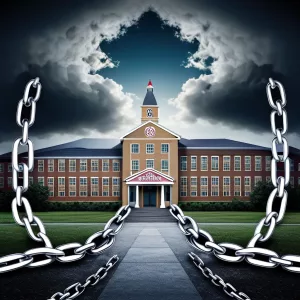In South Africa, police wellness is being boosted through exciting workshops where different experts come together to tackle tough challenges facing officers. Recently, a vibrant gathering at the Birchwood Hotel brought together police leaders, health officials, and community members to share ideas and find better ways to support the police force. They discussed important topics like mental health, accountability, and the need for better working conditions. Everyone left feeling hopeful and ready to make real changes that will not only help the police but also create a safer and happier South Africa for all.
In her powerful speech, Minister Thembi Simelane shines a light on South Africa’s journey toward a fairer future. She talks about fixing old wrongs from the past, like land dispossession, and emphasizes the importance of providing homes for all, especially for firsttime buyers and students. Simelane highlights the government’s plans to build more houses and support military veterans, showing a commitment to empower every community. With a strong focus on justice and growth, her words inspire hope for a brighter tomorrow in South Africa.
PEPFAR is like a lifeline for South Africa, helping to fight HIV and tuberculosis (TB). It provides crucial funding and employs over 15,000 health workers, making it easier for people to get the treatment they need. But now, cuts to this aid are putting many lives at risk, especially for vulnerable groups like drug users and sex workers. With less support, these communities may struggle to access vital care, which could lead to more infections and serious health problems. South African health organizations are now reaching out for help from businesses and individuals to fill the gaps and keep these important services running.
The State of the Nation Address (SONA) in South Africa is a key moment for the country, where leaders reflect on successes and challenges, while outlining future plans. Minister Ramokgopa emphasizes the importance of unity and economic growth, calling for everyone to work together for a brighter future. He recalls the Freedom Charter, a historic document promoting equality, as a guiding light for collaboration among different political groups. Addressing the economy, he sets ambitious growth goals and focuses on improving infrastructure to boost development. Overall, Ramokgopa’s message is one of hope and determination, urging South Africans to stand united for progress.
In his powerful speech, President Ramaphosa called for all South Africans to come together and work towards a better future. He highlighted the importance of listening to different voices and addressing past wrongs, especially about land reform. The President also shared exciting plans for rebuilding communities, boosting the economy, and embracing new technology. With a focus on unity and progress, he painted a hopeful picture of a resilient South Africa ready to face its challenges and thrive together.
The South African Social Relief of Distress (SRD) grant is a vital lifeline for people facing tough times, especially during crises. Managed by SASSA, this financial aid helps millions and has recently been extended until 2025. A recent court ruling could open the doors for even more people to access this important support, despite SASSA’s worries about costs. However, the application process can be tricky, especially for those without internet access, but SASSA provides options to help everyone apply. Ultimately, the SRD grant reflects a commitment to helping those in need and fighting against poverty in South Africa.
The Presidential Youth Employment Initiative (PYEI) in South Africa is a bright spark of hope for young people. Launched in 2020, this program helps connect education to jobs by providing training and support for local economies. In just a few years, it has created over 1.57 million work opportunities, helping many young South Africans find their place in the workforce. With innovative funding and strong community ties, the PYEI not only changes lives, like Thandi’s journey into digital marketing, but it also inspires a future full of possibilities for all youth in the country.
The Ultra Music Festival in South Africa is back and better than ever, celebrating its tenth anniversary on May 910! Fans can expect amazing performances from international stars like Armin van Buuren and KSHMR, alongside local favorites like Shimza and DBN GOGO. Set against the stunning backdrops of Cape Town and Johannesburg, this festival promises thrilling music, dazzling stage designs, and a fun celebration of South Africa’s rich culture. Get ready for an unforgettable party that combines global sounds with local flavors!
The South African Department of Home Affairs is facing big problems that upset many citizens. Long waits for important documents like ID cards and birth certificates, along with mistakes in records, leave people feeling frustrated and helpless. Social media has become a place for people to share their stories of struggle and hope for change. Thankfully, new leadership, like Minister Dr. Leon Schreiber, is stepping in to fix these issues and improve how the department serves its people. With the right efforts, there’s a chance for a brighter future where everyone can get the help they need.
South Africa’s 2025 Budget, set to be revealed by Finance Minister Enoch Godongwana, is a key moment for the nation as it outlines how money will be spent to boost the economy and help the people. This budget is more than just numbers; it’s a chance for everyone to see how their taxes support services like education and healthcare. The event will take place at the Nieuwmeester parking Dome, symbolizing a blend of tradition and modernity. With a focus on fairness and future growth, this budget aims to unite South Africans in a shared vision for a better tomorrow.
South Africa’s online shopping scene is buzzing with excitement! Takealot is the big boss, with 89% of shoppers loving its offerings. But new players like Temu and Shein are catching up fast, grabbing 40% and 39% of the crowd, respectively. Grocery shopping online is also on the rise, with Checkers Sixty60 leading the way. As more people shop online than ever before, the competition is heating up, promising shoppers even more choices and deals!
President Ramaphosa dreams of a united South Africa where everyone has equal chances to succeed. He calls for people to work together, learning from the past to heal old wounds and build a brighter future. By focusing on homegrown solutions and local businesses, he encourages citizens to take charge of their own lives. Ramaphosa’s vision is clear: through unity and resilience, South Africa can overcome challenges and shine as a symbol of hope and growth for all.
Adolescent suicide is becoming a serious problem in South Africa, with many young people feeling overwhelmed by school, family issues, and money troubles. Between April and December 2024, over 7,400 children were treated for suicide attempts, showing just how urgent this crisis is. Schools, once safe places, are now crucial for spotting and helping struggling students. Community support and open conversations about mental health are essential to create an environment where young people feel understood and supported. With the right help, many can find hope and healing instead of despair.
Books on the Bay 2025 is a joyful celebration of literature happening in Simon’s Town from March 14th to 16th. With over 30 famous authors attending, it promises exciting talks, book launches, and cultural experiences that shine a light on the town’s rich history. Attendees can look forward to engaging discussions, like those with popular cartoonists Zapiro and Gado, and the unveiling of the final Spud book by John van de Ruit. This festival is not just for book lovers; it welcomes everyone to enjoy the beauty of the coast while diving into important topics and community spirit.
The partnership between South Africa and India is a powerful bond that goes back to the fight against apartheid. It’s not just about history; both countries share dreams for a better future through advanced technology and strong defense. Deputy Minister Bantu Holomisa highlights the importance of working together, especially to prepare for new challenges like climate change and terrorism. By involving young people and focusing on humanitarian efforts, they are building a brighter, safer tomorrow for everyone. This friendship shows how countries can unite to create peace and growth in a complex world.
South Africa is stepping into a new chapter with the launch of its National Petroleum Company, aiming to take charge of its oil resources. This bold move is about bringing the government and private businesses together to create jobs and better infrastructure. The company will not only help boost the economy but also address important issues like healthcare and education. As South Africa navigates this exciting path, it’s committed to being responsible and environmentally friendly while inviting everyone to join the conversation about its energy future. This marks a significant moment for the nation, blending its rich history with hopes for a brighter tomorrow.
















